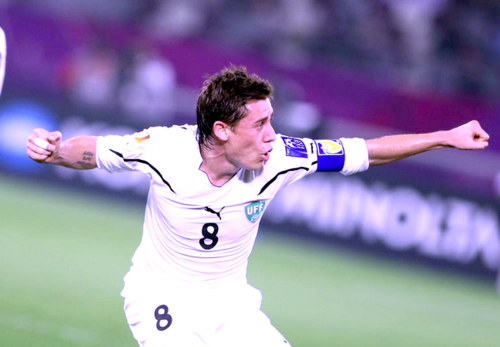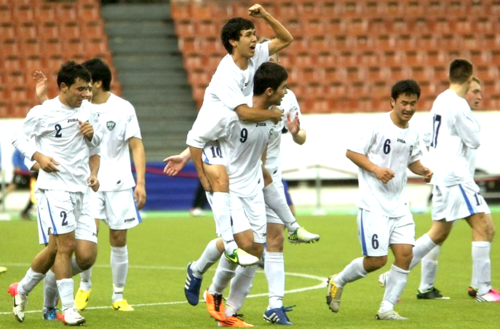A new Asian power? Tracking the rise of football in Uzbekistan
A new Asian power? Tracking the rise of football in Uzbekistan


By Shuaib Ahmed
Wolves are a fascinating species. When it comes to sustaining dominance, wolves tend to display an act of submission or ‘giving in’ to the dominant wolf. On the other hand, the dominant wolf, known as the alpha male, demonstrates his power by getting each and every pack member’s attention.
Similar is the case of the 'White Wolves’ of Asian football at a continental and eventually, a global platform. If you were to ask me a year ago what is the Central Asian country of Uzbekistan known for I would have answered: gold, copper and natural gas. Never football.
Critics in the Asian scene have consistently underrated and written off Uzbekistan in major tournaments and the Uzbeks in return have somehow proved them wrong. With encouraging performances last year alone from all levels, starting at U-16 through to the AFC Champions League and all the way to the national team, perhaps it will only be a matter of time until we see Uzbekistan rise to the same level alongside such Asian greats as Japan, South Korea, Iran and Australia.
One of the most esteemed clubs of the nation, FC Bunyodkor, a club where the colossal Rivaldo played for 3 years, including a season under Scolari’s management (now back at the helm of Brazil); carries quite some story. It only took the club 3 years, since their formation in 2005, to reach the AFC Champions League, and that too bowing out to Australian side Adelaide United in the semi-finals. A historic achievement by all means. And since then, they’ve managed to get past the group stages in each of the following AFC Champions League seasons.

At the preceding AFC Champions League, they beat the very team that denied the club from moving into the finals in their inaugural season, to set up a semi-final clash with South Korean side Ulsan Hyundai. Bunyodkor, at this point, was only a few difficult steps away from staking a claim as Champions of Asia and consequently, facing the big dogs of various continents in the prestigious FIFA Club World Cup in December. However, such tale did not turn into gold, and instead they bowed out in the semi-finals yet again.
Drifting away from the club scene over to the international squad, they too have been improving and enjoying a solid outing as well. They’ve strengthened their case at the Asian level with quarter-final finishes in both the 2004 and 2007 editions of the AFC Asian Cup. Four years later and progress was once more evident, achieving a convincing and rewarding 4th place finish in the 2011 AFC Asian Cup held in Qatar.
Uzbekistan’s development has not stagnated, in fact the ambitions have only grown, with their main objective now being to reach the 2014 World Cup. Surprisingly or not, their goal is looking realistic, as they currently sit on top of Group B in the AFC qualification.
With three more games remaining in their attempt to earn a spot in Brazil, their subsequent back-to-back 1-0 victories over Qatar and Iran, has given them the confidence they need to appear in their first ever World Cup. As it stands right now, Group B of the Asian qualifiers is open for any of the 5 teams for the taking, where South Korea are the natural favourites. Anything is possible.

The future of Uzbekistan looks bright too, which is important for their continuation and growth. The U-16 team, after being runners up in the 2010 AFC Championship, lost to Uruguay in the quarter-finals of the 2011 FIFA U-17 World Cup in Mexico. This time round, the young 'White Wolves’ ended up winning the 2012 AFC Championships held in Iran, having beaten all three regional heavy weights in succession; South Korea in the quarters, Iran in the semis and finally, Japan. This victory earned them an automatic berth in next year’s FIFA U-17 World Cup, which will be hosted by the United Arab Emirates.
Off the field there have also been achievements, with the country’s FA winning the prestigious FIFA Fair Play Award at the Ballon d’Or Awards earlier this year. This comes after Uzbekistan was awarded the equivalent in Asia based on the dedication and good behaviour displayed by Uzbek national teams and club sides participating in AFC competitions during the past year.
In all seriousness, Uzbek football is making amendments to the way the world views Asian football. Their physical strength and aggressive style of play can only be matched by Australia, and with technical players like the Uzbek Maradona, Server Djeparov, as well as Azizbek Haydarov, the midfield looks set for glory in the immediate future. The attack is lacking a consistent performer, but with this unknown country comes many unknown, but positive possibilities.
So if you were to ask me the same question today: for what is the Central Asian country of Uzbekistan known? I would certainly add football to that list.
This article is Shuaib’s first for AFR. You can follow him on twitter @footynions and his blog footynions. Comments below please.







